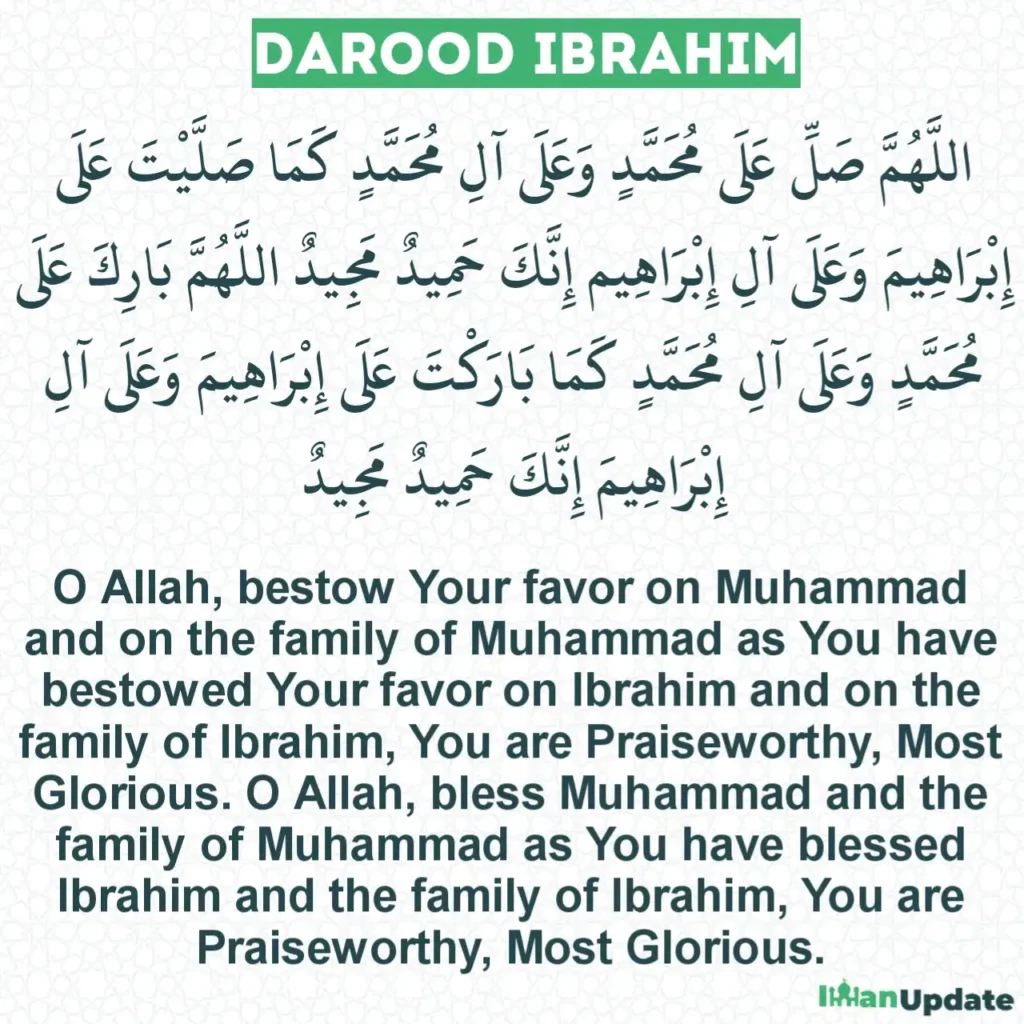Durood Ibrahim: The Best Salutation Upon the Prophet (SAW)

Durood Ibrahim, also commonly referred to as Salatul Ibrahimiyyah, is a special prayer upon the Prophet Muhammad (SAW) that was taught by the Prophet himself.
This particular salutation holds a unique status as it is considered one of the most complete and perfect forms of sending blessings upon the Prophet (SAW).
It has been preserved in various collections of Hadith, such as Sahih Bukhari and Sahih Muslim, which emphasize its significance in Islamic tradition.
The Revelation and Importance of Durood Ibrahim
The Prophet Muhammad (SAW) revealed this prayer as a means for his followers to fulfill their obligation of sending peace and blessings upon him. It is typically recited during the sitting position (tashahhud) in salah, following the recitation of Attahiyat.
While there are numerous forms of Durood, Durood Ibrahim is widely regarded as the most authentic and superior version. Many scholars highlight that this is the salutation closest to what was prescribed by the Prophet (SAW) himself.
Durood Ibrahim in Arabic and English
The words of Durood Ibrahim are a source of immense barakah (blessing), and it is beneficial to recite it regularly, not just in prayer but also in daily life. Here is the Durood Ibrahim in its original Arabic form:
اللَّهُمَّ صَلِّ عَلَى مُحَمَّدٍ وَعَلَى آلِ مُحَمَّدٍ كَمَا صَلَّيْتَ عَلَى إِبْرَاهِيمَ وَعَلَى آلِ إِبْرَاهِيم إِنَّكَ حَمِيدٌ مَجِيدٌ اللَّهُمَّ بَارِكَ عَلَى مُحَمَّدٍ وَعَلَى آلِ مُحَمَّدٍ كَمَا بَارَكْتَ عَلَى إِبْرَاهِيمَ وَعَلَى آلِ إِبْرَاهِيمَ إِنَّكَ حَمِيدٌ مَجِيدٌ
Transliteration
Allaahumma salli ‘alaa Muhammadin wa ‘alaa ‘aali Muhammadin, kamaa sallayta ‘alaa ‘Ibraaheema wa ‘alaa ‘aali ‘Ibraaheema, ‘innaka Hameedun Majeed. Allaahumma baarik ‘alaa Muhammadin wa ‘alaa ‘aali Muhammadin, kamaa baarakta ‘alaa ‘Ibraaheema wa ‘alaa ‘aali ‘Ibraaheema, ‘innaka Hameedun Majeed.
English Meaning
The meaning of darood Ibrahim is O Allah, bestow Your favor on Muhammad and on the family of Muhammad as You have bestowed Your favor on Ibrahim and on the family of Ibrahim, You are Praiseworthy, Most Glorious. O Allah, bless Muhammad and the family of Muhammad as You have blessed Ibrahim and the family of Ibrahim, You are Praiseworthy, Most Glorious.
READ ALSO: Dua For Sneezing and Reply in Arabic and English
The Benefits of Reciting Durood Ibrahim
Reciting Durood Ibrahim is not merely a verbal act of devotion; it brings with it countless spiritual benefits that deeply affect a Muslim’s heart and soul. Some of the profound benefits of this salutation include:
- Following the Command of Allah: Allah instructs believers to send blessings upon the Prophet (SAW) in Surah Al-Ahzab (33:56), and through this Durood, one fulfills this divine command.
- Alignment with Angels: By sending blessings upon the Prophet, one joins the angels in their continuous act of praying for the Prophet (SAW).
- Gaining 10 Blessings from Allah: For every recitation, Allah sends 10 blessings upon the believer in return.
- Elevation in Rank: Every time a believer sends Durood, their status is elevated by 10 levels in the sight of Allah.
- Sins Are Erased: Ten sins are wiped from the record of the believer who recites Durood Ibrahim.
- Intercession on the Day of Judgement: The Durood becomes a means for the Prophet’s intercession on the Day of Judgement.
- A Path to Forgiveness: It serves as a means for the forgiveness of one’s sins and draws a person closer to Allah’s mercy.
The Command to Send Blessings: Surah Al-Ahzab (33:56)
Allah states in Surah Al-Ahzab (33:56):
“‘Surely, Allah and His angels send salaat upon the Prophet. 0 you who believe, send salaat upon him and salute him with a salutation of peace.’
This verse emphasizes the immense honor that Allah has bestowed upon His beloved Prophet (SAW). By sending blessings upon the Prophet, believers not only fulfill a divine command but also share in the honor of glorifying the Prophet (SAW).
It is a way to express love and gratitude for his guidance and to acknowledge his role as the final Messenger.
When to Recite Durood Ibrahim
Durood Ibrahim can be recited at any time, but there are specific occasions where its recitation is highly recommended. These include:
- During Salah: It is recited in the final sitting (tashahhud) of each salah, right before the tasleem (concluding salaam).
- After the Adhan (Call to Prayer): Following the adhan, it is recommended to recite Durood Ibrahim and then make dua for the Prophet (SAW), asking Allah to grant him Al-Waseelah.
- On Fridays: The Prophet (SAW) encouraged Muslims to increase their recitation of Durood on Fridays as it is the most blessed day of the week.
- Before Making Dua: Beginning any dua by praising Allah and sending blessings upon the Prophet (SAW) increases the likelihood of the dua being accepted.

The Prophetic Guidance on Sending Blessings
In a hadith narrated by Ubayy ibn Ka’b, he asked the Prophet (SAW) how much of his supplication should be reserved for sending blessings upon him.
The Prophet (SAW) replied, “As much as you wish, but if you increase it, it will be better for you.” When Ubayy asked if he should dedicate his entire supplication to sending blessings upon the Prophet, the Prophet (SAW) said, “Then your worries will be relieved and your sins will be forgiven.” (At-Tirmidhi)
The Merits of Sending Durood Ibrahim
Sending blessings upon the Prophet (SAW) is an act filled with countless merits. The Prophet (SAW) said, “Whoever sends blessings upon me once, Allah will send blessings upon him ten times.” (Muslim)
This highlights not only the spiritual rewards but also the mercy and blessings one receives from Allah through this act.
Additionally, the angels bear witness to these blessings, and the Prophet (SAW) himself is informed of the salutations sent to him by his ummah.
The Impact on One’s Life and Hereafter
In addition to the spiritual rewards, sending Durood Ibrahim has a transformative impact on one’s life. It brings inner peace, strengthens one’s connection to the Prophet (SAW), and purifies the heart.
On the Day of Judgement, those who frequently send blessings upon the Prophet will find themselves closer to him, a source of great honor and protection on that fateful day.
Conclusion
Reciting Durood Ibrahim is more than just a ritual; it is an expression of love, gratitude, and obedience. It serves as a continuous reminder of the blessings that the Prophet Muhammad (SAW) has brought to humanity and is a means of drawing nearer to Allah through devotion to His Messenger.
As Muslims, incorporating Durood Ibrahim into daily life strengthens faith, brings barakah, and prepares the soul for eternal success.
We should strive to make the recitation of Durood Ibrahim a regular part of our lives, especially in moments of prayer, reflection, and remembrance. May Allah enable us to honor His Messenger (SAW) and shower him with His mercy and blessings.






